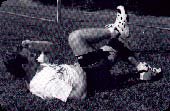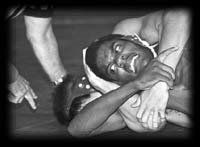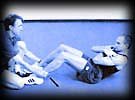Often in training, athletes attempt to create an ideal environment for maximum strength. I mean, who attempts a personal best in a lift when they are fatigued? In fact, many "strength gurus" will tell you that you should not even lift weights if you are fatigued and should instead take the day off or go light. I understand the principle behind this and it is applicable for power lifters, Olympic Weight Lifters, and bodybuilders.
Mental Toughness
However, athletes in sports such as football, wrestling, and mixed martial arts need something that is not often addressed in training: mental toughness. Most serious athletes know the importance of cardiovascular training, strength training, and sport-specific training. However, how many athletes make a point of incorporating training into their routines that focuses on mental toughness? What an athlete can do when he or she is fresh may be important.
 Nevertheless, what happens when that fresh strength is gone? Fresh strength dissipates quickly for athletes in tough sports and all that is left is muscular endurance and mental toughness to carry you through. Similar to anything else in life, the only way to be tough mentally is to train for mental toughness.
Nevertheless, what happens when that fresh strength is gone? Fresh strength dissipates quickly for athletes in tough sports and all that is left is muscular endurance and mental toughness to carry you through. Similar to anything else in life, the only way to be tough mentally is to train for mental toughness.
Controlled Fatigue
One very interesting concept for acquiring mental toughness is a training technique that Ori Hofmekler, author of the "Warrior Diet" calls "Controlled Fatigue." An example of "Controlled Fatigue" training would be sprinting all out for 10-20 minutes and then immediately engaging in a strength training session. In the beginning, you will find it difficult to complete your weight training sessions. However, over time you will adapt and you will be rewarded with a lethal dose of mental toughness.
 Make no mistake about it; it takes guts and courage to do something tough when you are fatigued. It is much easier when everything is perfect. Nevertheless, it is highly likely that things will not be perfect when you need to apply your strength. When you are in the middle of a wrestling match and the fatigue is becoming unbearable, you cannot stop the match and continue the next day when you are fresh.
Make no mistake about it; it takes guts and courage to do something tough when you are fatigued. It is much easier when everything is perfect. Nevertheless, it is highly likely that things will not be perfect when you need to apply your strength. When you are in the middle of a wrestling match and the fatigue is becoming unbearable, you cannot stop the match and continue the next day when you are fresh.
What you can do, however, is train to become comfortable with fatigue. When you become comfortable with fatigue, you will not fear it anymore and will be able to persevere when things get tough. You will be able to tap into an inner strength that you were not aware of and carry forward.
Since I train a great deal with dumbbells, I came up with a few other ways to apply "Controlled Fatigue" training for mental toughness. Instead of doing strength training exercises such as presses and other lifts that require heavy weights and low repetitions first, do some high repetition ballistic exercises at the beginning of your workout. For example, start your workout with three sets of 15 dumbbell snatches, and then do some military presses right after that. This will be a challenge at first and you will have to leave your ego at the door. Your strength will be down which can cause a negative mental state.
Never Give Up
Recall a time that you tried to workout when everything was out of synch. Your energy was low and the weights felt heavier than normal. On days like that, you want to throw in the towel and go home. However, every time you give up when things get difficult, you lose a part of who you are and what you are capable of achieving.
You will be hard pressed to find anyone in life who is successful at anything that did not have to dig dip and apply mental toughness in order to move forward. Don't expect anything less from yourself when training. The rewards will be worth all of the pain.
The following are a few examples of mental toughness routines:
 Example 1:
Example 1:
- 500 Hindu Squats followed by:
- 5x5 Military Presses
- 5x5 One-Legged Squats
- 5x5 Dumbbell Power Cleans
Click Here For A Printable Log Of Example 1
Example 2:
- 25 Dumbbell Snatches followed by:
- 5x5 Two-Arm Dumbbell Military Presses
- 1x5 Turkish Get Up
- 3x10 Barbell Squats
Click Here For A Printable Log Of Example 2
Example 3:
- 50-Yard Sprints (10 times) followed by:
- 5x5 One-arm clean and presses with dumbbell
- 3x3 One-Legged Squats with weight.
- 5x5 Weighted Chin Ups
Click Here For A Printable Log Of Example 3
Example 4: 
- Jump Rope for 10-15 minutes
- Barbell Clean and Presses 5x5
- Janda Sit-ups 4x5
- Front Squats 3x8
Click Here For A Printable Log Of Example 4
Move immediately to the first exercise of your strength training routine after completing the "fatigue" exercises. However, take two to three minutes in between each set of all of the exercises. Feel free to come up with your own routines. The possibilities are endless. Just remember to do some taxing muscular endurance drills for 10-20 minutes before engaging in your strength training sessions.
Summary of Mental Toughness Training
-
1. Do a full body exercise first that causes fatigue such as Sprints, Hindu Squats, and Snatches.
2. Do "grinding" movements such as Presses and Squats after being fatigued.
3. Avoid doing complicated lifts such as Turkish get up until you become proficient at mental toughness training.
4. Start with 2-3 mental toughness workouts per week.
5. Use lighter weights at first and gradually increase the poundage.
In addition to building mental toughness, this form of training is also excellent for burning excess fat and building muscular endurance for sports. Give it a shot for a few weeks and please report back to me with your results. For more information on "controlled fatigue training" check out the Warrior Diet, by Ori Hofmekler at www.dragondoor.com!
Good luck,
